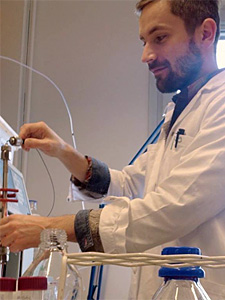Dr Błażej Ślązak
Assistant Professor

Research interests
- Chemical Ecology, plant biochemistry, pharmacognosy.
- Plant defence mechanisms.
- Plant defence peptides.
- Plant in vitro cultures.
- Ex situ biodiversity protection – propagation of rare species producing valuable medicinal compounds.
Higher education and employment history
- MSc degree at the Jagiellonian University (2008).
- Specialist in pharmacoeconomics at the Arcana Institute LTD, A Certara Company (2010–2013).
- PhD degree at the Jagiellonian University (2014).
- Assistant Professor at the W. Szafer Institute of Botany, PAS (since 2015).
International experience
- Sweden (2013) – 3-month research stay financed by the Ahlquist Foundation grant for research exchange, the Jagiellonian University Statutory Fund, and Erasmus Practice Program; Faculty of Pharmacy, Uppsala University.
- Sweden (2015) – 2-month research stay financed by Ahlquist Foundation grants for research exchange; Faculty of Pharmacy, Uppsala University.
- Sweden (2015) – 1 month research stay financed by the W. Szafer Institute of Botany, PAS (grant "Young Scientists"), and the Jagiellonian University Statutory Fund; Faculty of Pharmacy, Uppsala University.
- Sweden (2015) – 16-day training "Soft skills and entrepreneurship" financed by the Ministry of Research and Higher Education (Poland); Lund University.
- Sweden (2016, 2017) – 6-month post-doc financed by the Tryggers Foundation; Faculty of Pharmacy, Uppsala University.
- Sweden (2019) – 1-month research stay financed by the Ahlquist Foundation grant for research exchange; Faculty of Pharmacy, Uppsala University.
- Sweden (2018) – 4-month research stay financed by the National Science Centre (NCN), MINIATURA grant; Faculty of Pharmacy, Uppsala University.
- Sweden (2019) – 2-week research stay financed by the National Science Centre (NCN), SONATA grant; Faculty of Pharmacy, Uppsala University.
- Sweden (2019) – 2-week research stay financed by the National Science Centre (NCN), SONATA grant; Faculty of Pharmacy, Uppsala University
- Spain, Canary Islands (2019) – 2-week research expedition financed by the Regnells Foundation travel grant; Las Palmas University.
- Sweden (2019) – 4-month research stay financed by the National Science Centre (NCN), SONATA grant; Faculty of Pharmacy, Uppsala University.
- Sweden (2020) – 1.5-month research stay financed by the National Science Centre (NCN), SONATA grant, and the Swedish Agency for Marine and Water Management grant; Faculty of Pharmacy, Uppsala University.
Research projects
- Cyclotides – cyclic plant polypeptides – metabolism in the plant and the environment and role in defense mechanisms (2015); grant "Young Scientists"; W. Szafer Institute of Botany, PAS – project leader.
- The role of cyclotides produced by violets (Violaceae) in interactions with plant pests: spider mites and aphids (2017); grant "Young Scientists"; W. Szafer Institute of Botany, PAS – project leader.
- Cyclotides – cyclic plant polypeptides in defense mechanisms against pathogenic fungi (2017–2018); grant no. 2017/01/X/NZ8/00606; National Science Centre (NCN) – project leader.
- Violets and pansies from Canary Islands – studying cyclotides in endemic species/local varieties and the influence of environmental conditions on their expression patterns (2018); Regnells Foundation grant (Faculty of Pharmacy, Uppsala University) – project leader.
- How does sweet violet (Viola odorata L.) fight pathogens and pests – are cyclotides a type of plant immune system? (2018–2021); grant no. 2017/26/D/NZ8/00658; National Science Centre (NCN) – project leader.
- BIAS I: Biomarker discovery of invasive alien species I (2019–2020); Swedish Agency for Marine and Water Management research grant – collaborator.
Recent publications (selected)
Miszczak R., Slazak B., Sychta K., Göransson U., Nilsson A., Słomka A. 2025. Interpopulational variation in cyclotide production in heavy-metal-treated pseudometallophyte (Viola tricolor L.). Plants 14: 471. DOI
Gerlach S.L., Metcalf J.S., Dunlop R.A. Banack S.A., Her C., Krishnan V.V., Göransson U., Gunasekera S., Slazak B., Cox P.A. 2024. Kalata B1 enhances temozolomide toxicity to glioblastoma cells. Biomedicines 12: 2216. DOI
Rajendran S., Slazak B., Mohotti S., Muhammad T., Strömstedt A.A., Kapusta M., Wilmowicz E., Göransson U., Hettiarachchi C.M., Gunasekera S. 2023. Screening for cyclotides in Sri Lankan medicinal plants: Discovery, characterization, and bioactivity screening of cyclotides from Geophila repens. Journal of Natural Products 86: 52–65. DOI
Slazak B., Jędrzejska A., Badyra B., Shariatgorji R., Nilsson A., Andrén P.E., Göransson U. 2022. The influence of plant stress hormones and biotic elicitors on cyclotide production in Viola uliginosa cell suspension cultures. Plants 11: 1876. DOI
Slazak B., Jędrzejska A., Badyra B., Sybilska A., Lewandowski M., Kozak M., Kapusta M., Shariatgorji R., Nilsson A., Andrén P.E., Göransson U., Kiełkiewicz M. 2022. The involvement of cyclotides in mutual interactions of violets and the two-spotted spider mite. Scientific Reports 12: 1914. DOI
Rajendran S., Slazak B., Mohotti S., Strömstedt A.A., Göransson U., Hettiarachchi C.M., Gunasekera S. 2021. Tropical vibes from Sri Lanka – cyclotides from Viola betonicifolia by transcriptome and mass spectrometry analysis. Phytochemistry 187: 112749. DOI
Slazak B., Kaltenböck K., Steffen K., Rogala M., Rodríguez-Rodríguez P., Nilsson A., Shariatgorji R., Andrén P.E., Göransson U. 2021. Cyclotide host-defense tailored for species and environments in violets from the Canary Islands. Scientific Reports 11: 12452. DOI
Dancewicz K., Slazak B., Kiełkiewicz M., Kapusta M., Bohdanowicz J., Gabryś B. 2020. Behavioral and physiological effects of Viola spp. cyclotides on Myzus persicae (Sulz.). Journal of Insect Physiology 122: 104025. DOI
Slazak B., Haugmo T., Badyra B., Göransson U. 2020. The life cycle of cyclotides: biosynthesis and turnover in plant cells. Plant Cell Reports 39: 1359–1367. DOI
Slazak B., Kapusta M., Strömstedt A.A., Słomka A., Krychowiak M., Shariatgorji M., Andrén P. E., Bohdanowicz J., Kuta E., Göransson U. 2018. How does the sweet violet (Viola odorata L.) fight pathogens and pests – Cyclotides as a comprehensive plant host defense system. Frontiers in Plant Science 9: 1296. DOI
Uddin S.J., Muhammad T., Shafiullah M., Slazak B., Rouf R., Göransson U. 2017. Single-step purification of cyclotides using affinity chromatography. Biopolymers 108: e23010. DOI
Slazak B., Kapusta M., Malik S., Bohdanowicz J., Kuta E., Malec P., Göransson U. 2016. Immunolocalization of cyclotides in plant cells, tissues and organ supports their role in host defense. Planta 244: 1029–1040. DOI





